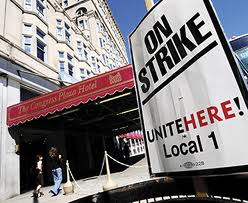
One of the benefits to the Tea Party election of 2010 has been the effort to reduce labor’s influence in America. You’ve seen it in Wisconsin, you saw it in Indiana and now the results coming in from Tennessee.
States are turning to “Right to Work” legislation that allows employees to opt in or opt out of a union. To be clear, some state allow you to opt out of a union, however, you still “get” to pay the union dues – wonderful option opting out is, yes?
So, how is Tennessee benefiting from their labor stance?
Michigan may be Motor City’s home in most people’s minds, but Tennessee has emerged as another major hub of auto manufacturing and related industries. Big domestic and foreign automakers have several facilities here and are expanding rapidly.
Tennessee, one of many Super Tuesday GOP primary states, has mostly been spared the trauma of mass layoffs, closures and bailouts that plagued the Rust Belt. Business and free-market groups cite a key advantage: It is a right-to-work state, effectively preventing Big Labor from being a major player there.
It’s growing. And growing rapidly.
And the advantage of Right to Work laws are such that even shops that ARE union are forced to innovate, to invent to become more productive. If they don’t, they fail. This same incentive is not in place in full union states. When all shops are controlled by the unions, the productivity of one slow plant isn’t different than the productivity of the other slow plant.
And why might businesses wanna come to these Right to Work states?
Tennessee’s law has held down labor costs. VW pays $27 an hour for new employees in wages and benefits, about half of the $52 an hour labor cost in Detroit. When the unionized GM agreed to reopen the Spring Hill plant last year, it forced the UAW to accept a starting wage of $15.78
It keep the cost of labor down. Now, you may ask how that’s a good thing; how paying someone $27 an hour is better for that someone than paying them $52 an hour.
Critics cite the lower wages as proof that the laws hurt workers. But locals say that’s offset by lower living expenses. Nashville’s cost of living is 11% below the U.S. average, the Census Bureau reports. Detroit’s is only 1% below.
Tennessee isn’t immune to the auto industry’s ups and downs, but seems to weather them well.
“We got through the recession without major layoffs,” Woolley said. “There were a lot of curtailments and furloughs (for workers), a lot of short workweeks, but now we are back at full speed.”
When labor is less expensive, the things made with that labor are less expensive as well. And, as always, while unions may increase wages for their members, they increase wages to the point that fewer and fewer workers are hired in the first place.
Big Labor’s place in America has gone by the roadside; and THAT is great news.



